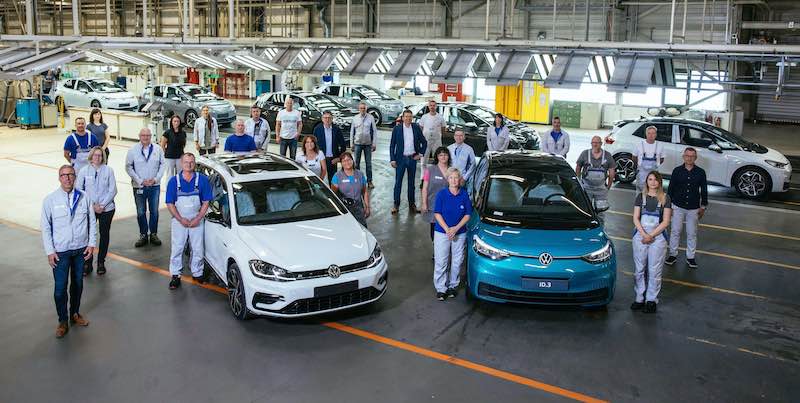A factory owned by Volkswagen in Germany’s “City of Cars,” Zwickau, has produced its last ever combustion engine vehicle, closing a 116-year chapter on fossil-fuelled cars and switching to electric vehicle production, only.
Volkswagen said in a statement late last week that the last model with a combustion engine left the assembly line on Friday at the Zwickau car factory – a seventh-generation Golf R Estate with 2.0-litre petrol engine in Oryx White Pearl Effect.
“From today on, only electric models of Volkswagen and in future also of the sister brands Audi and Seat will be produced in Zwickau,” the statement said.
This, in itself, is a big enough milestone for a factory that has operated since 1904 and turned out more than 6 million Volkswagen ICE cars since 1990. But the Zwickau factory will also mark the first time the car maker has switched a large car factory completely to electric mobility.
For this reason, the transformation will not be immediate, with a “conversion phase” taking place over several weeks of the European summer and a qualification program for all 8,000 of the plant’s employees that will see them complete around 20,500 days of training.
Once all of this is complete, the Zwickau factory is expected to start producing the first of its fully electric vehicles by the end of the year, including the ID.4 and possibly an SUV from the sister brand, Audi.
As it happens, the ID.4 all-electric SUV – a competitor to the forthcoming Tesla Model Y – is expected to be the first all-electric Volkswagen to come to the Australian market, with a loose date set for 2022.
“Zwickau is steeped in German automotive tradition,” said Jens Rothe, Volkswagen’s chair of the general works council.
“Our team has always delivered excellent performance and built vehicles with excellent quality. We have gained the trust in the Group to become the first location to start fully electric large-scale series production. The Zwickau plant is therefore well-equipped for the future.”
Reinhard de Vries, the managing director of technology and logistics at Volkswagen Sachsen said the day was an historic one for the car maker, and part of a “long leap” into the modern automobile age.
“The trend towards electric mobility will continue to pick up speed,” de Vries said in a statement. “We will meet this demand from Zwickau: we have already created the capacity to build 330,000 vehicles next year.”
The switch at Zwickau is part of Volkswagen’s plans to spend nearly €60 billion ($A97.3 billion) over the coming few years on a large-scale transition to EVs, with plans to roll out 75 all-electric vehicle models along with around 60 hybrid models.
Much of the success of this transition rides on the company’s modular electric toolkit (MEB) platform, which was developed specifically for electric cars and to “exploit the possibilities offered by electric mobility.”
The first fruit of this platform, the Volkswagen ID.3, is set to have long ranges, generous interior space and dynamic driving behaviour – although a recent report out of Germany suggested all was not running according to plan with the MEB rollout.
The base version of the ID.3 will cost less than €30,000 (just under $A50,000), with the market launch of the 1st Edition set to take place throughout Europe in September 2020.

Sophie is editor of One Step Off The Grid and deputy editor of its sister site, Renew Economy. Sophie has been writing about clean energy for more than a decade.

